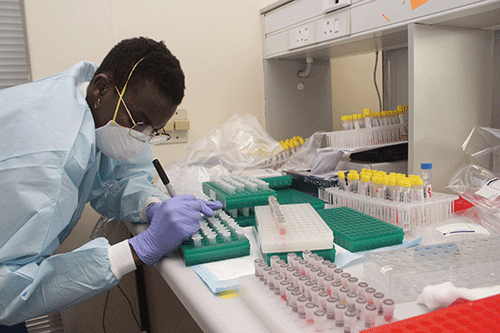Covid-19 did not just leave a trail of disruption and destruction in its wake, on a positive note it forced communities and countries to collaborate and discuss ways to navigate through the carnage and help us understand the importance of people behind the scenes.
The Chargé d’affaires at the US embassy, Jessica Long said Namibia’s success in testing for Covid-19 is one of the reasons why the country will see an end to the third wave and lab technicians are helping in reaching better times.
Long said this when staff from the US Centres for Disease Control and Prevention (CDC) in Namibia have been volunteering to assist the Namibia Institute of Pathology Limited (NIP) laboratory team to sort the samples received from testing sites across the country.
“We are able to understand how quickly the virus is spreading and the country can adjust its public health regulations accordingly. The laboratory technicians across the country are playing a behind-the-scenes role in helping us to reach better times. Namibia cannot fight this pandemic without them,” said Long.
From not having the capacity to test for the novel coronavirus, Namibia now has the capacity and will to massively test people, despite an exponential third wave that has seriously challenged the country.
What is more progressive is that people are getting tested and receiving their results, often within 24 to 48 hours, making it easier for people to know whether or not they have Covid-19 and to make the right decisions on the next steps they should take.
Long detailed: “Samples come to the Windhoek NIP lab from clinics and hospitals across the country. When they arrive, the first step is to unpack the boxes. Inside are samples, accompanied by the case information forms. The forms are checked for any that are urgent and organised into alphabetical order to speed up the process of re-matching the forms to the samples.”
She added that each sample is then matched to its form to check that all documentation is in place because sometimes some samples can arrive without forms, or some forms can arrive without samples. Any urgent samples are quickly identified and prioritised for testing.
The sorting process is simple but is laborious and takes time. Once each sample is matched to the corresponding form, the sample is manually labelled with the unique patient information number on the form. The samples are then organised into a sample tray, ready to be loaded into the testing machine or for manual extraction.
Tuku Ndevaetela, a CDC Namibia volunteer assisting with the sorting of samples recalled the work done in the lab and the logistics surrounding everything.
“The laboratory staff are working long hours, every day of the week testing the Covid-19 samples. These people are unsung heroes. I am in awe of the laboratory staff who have been working in the Covid-19 laboratory for the last 18 months,” said Ndevaetela.
“We can see just how serious the situation is and we know what needs to be done. But we do not know if the public will take the steps needed to stop the virus from spreading. The laboratory technicians are delivering the results day after day, and the healthcare providers are caring for the sick, day after day. We need the public to stop the spread of the virus, day after day too. We all have to do our part to end this pandemic,” said CDC Namibia laboratory team leader Dr Suzanne Beard.
Beard shared that in the laboratory, they are seeing an increase in samples, and an increase in the proportion of positive results and urged Namibians to abide by the rules and get vaccinated.


